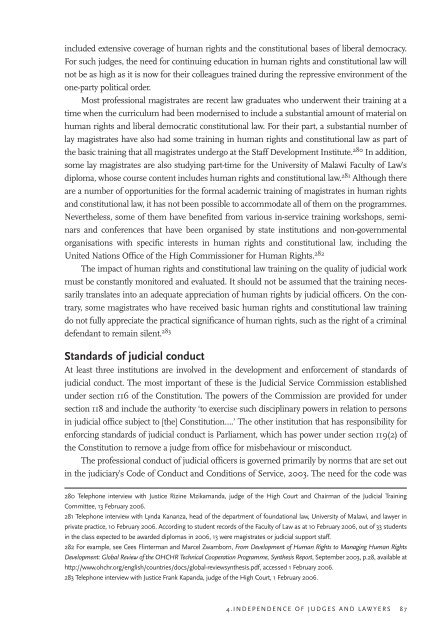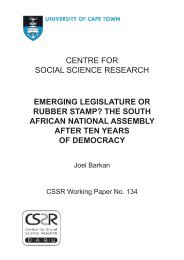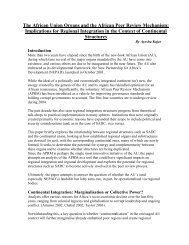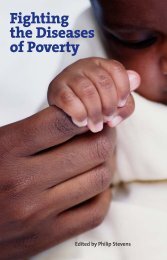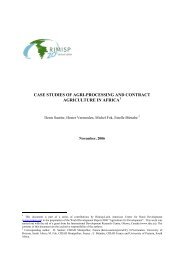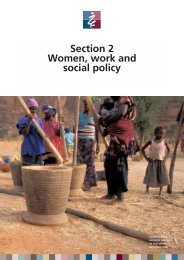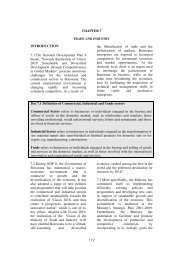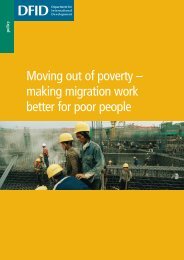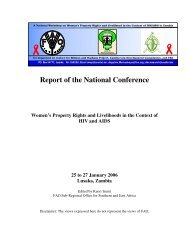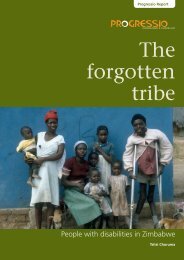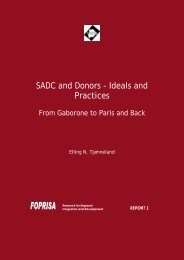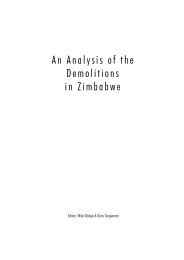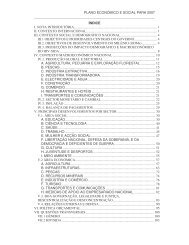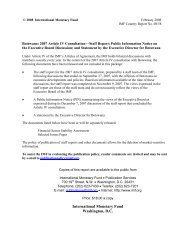Justice Sector and the Rule of Law - AfriMAP
Justice Sector and the Rule of Law - AfriMAP
Justice Sector and the Rule of Law - AfriMAP
Create successful ePaper yourself
Turn your PDF publications into a flip-book with our unique Google optimized e-Paper software.
included extensive coverage <strong>of</strong> human rights <strong>and</strong> <strong>the</strong> constitutional bases <strong>of</strong> liberal democracy.For such judges, <strong>the</strong> need for continuing education in human rights <strong>and</strong> constitutional law willnot be as high as it is now for <strong>the</strong>ir colleagues trained during <strong>the</strong> repressive environment <strong>of</strong> <strong>the</strong>one-party political order.Most pr<strong>of</strong>essional magistrates are recent law graduates who underwent <strong>the</strong>ir training at atime when <strong>the</strong> curriculum had been modernised to include a substantial amount <strong>of</strong> material onhuman rights <strong>and</strong> liberal democratic constitutional law. For <strong>the</strong>ir part, a substantial number <strong>of</strong>lay magistrates have also had some training in human rights <strong>and</strong> constitutional law as part <strong>of</strong><strong>the</strong> basic training that all magistrates undergo at <strong>the</strong> Staff Development Institute. 280 In addition,some lay magistrates are also studying part-time for <strong>the</strong> University <strong>of</strong> Malawi Faculty <strong>of</strong> <strong>Law</strong>’sdiploma, whose course content includes human rights <strong>and</strong> constitutional law. 281 Although <strong>the</strong>reare a number <strong>of</strong> opportunities for <strong>the</strong> formal academic training <strong>of</strong> magistrates in human rights<strong>and</strong> constitutional law, it has not been possible to accommodate all <strong>of</strong> <strong>the</strong>m on <strong>the</strong> programmes.Never<strong>the</strong>less, some <strong>of</strong> <strong>the</strong>m have benefited from various in-service training workshops, seminars<strong>and</strong> conferences that have been organised by state institutions <strong>and</strong> non-governmentalorganisations with specific interests in human rights <strong>and</strong> constitutional law, including <strong>the</strong>United Nations Office <strong>of</strong> <strong>the</strong> High Commissioner for Human Rights. 282The impact <strong>of</strong> human rights <strong>and</strong> constitutional law training on <strong>the</strong> quality <strong>of</strong> judicial workmust be constantly monitored <strong>and</strong> evaluated. It should not be assumed that <strong>the</strong> training necessarilytranslates into an adequate appreciation <strong>of</strong> human rights by judicial <strong>of</strong>ficers. On <strong>the</strong> contrary,some magistrates who have received basic human rights <strong>and</strong> constitutional law trainingdo not fully appreciate <strong>the</strong> practical significance <strong>of</strong> human rights, such as <strong>the</strong> right <strong>of</strong> a criminaldefendant to remain silent. 283At least three institutions are involved in <strong>the</strong> development <strong>and</strong> enforcement <strong>of</strong> st<strong>and</strong>ards <strong>of</strong>judicial conduct. The most important <strong>of</strong> <strong>the</strong>se is <strong>the</strong> Judicial Service Commission establishedunder section 116 <strong>of</strong> <strong>the</strong> Constitution. The powers <strong>of</strong> <strong>the</strong> Commission are provided for undersection 118 <strong>and</strong> include <strong>the</strong> authority ‘to exercise such disciplinary powers in relation to personsin judicial <strong>of</strong>fice subject to [<strong>the</strong>] Constitution….’ The o<strong>the</strong>r institution that has responsibility forenforcing st<strong>and</strong>ards <strong>of</strong> judicial conduct is Parliament, which has power under section 119(2) <strong>of</strong><strong>the</strong> Constitution to remove a judge from <strong>of</strong>fice for misbehaviour or misconduct.The pr<strong>of</strong>essional conduct <strong>of</strong> judicial <strong>of</strong>ficers is governed primarily by norms that are set outin <strong>the</strong> judiciary’s Code <strong>of</strong> Conduct <strong>and</strong> Conditions <strong>of</strong> Service, 2003. The need for <strong>the</strong> code was


